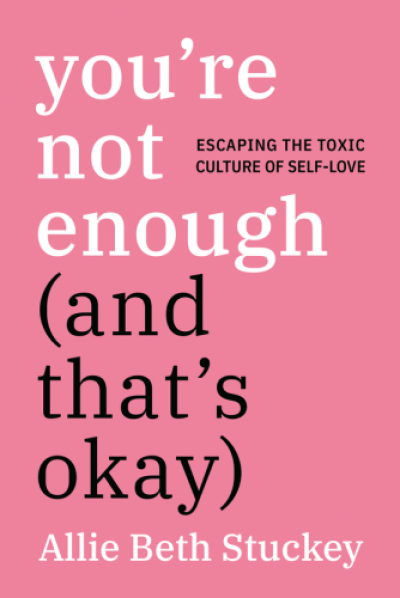Book excerpt: Allie Beth Stuckey on morality defined by the mob
From You're Not Enough (And That's Okay): Escaping the Toxic Culture of Self-Love by Allie Beth Stuckey published by Portfolio, an imprint of The Penguin Publishing Group, a division of Penguin Random House, LLC. copyright © 2020 by Allie Beth Stuckey

“Canceled” is what happens to you when the court of public opinion (held primarily on Twitter) decides that something you’ve said or done at any time in your life is unacceptable by today’s social and moral standards. Cancelers call for boycotts of your shows or products, demand that you be fired from your place of employment, command that you be deplatformed from social media and the apps that host your content, target your advertisers, and pressure organizations associated with you to disavow you. They take no prisoners.
Cancel Culture is the perfect depiction of how the secular world does morality without absolute truth: the boundaries of righteousness are ever changing based on the latest social whim. Because there’s no objective standard of right and wrong, people’s feelings are all we can base morality on. That means the group with the most cultural sway is typically in charge. What was acceptable yesterday, then, won’t be acceptable tomorrow, and so on.

Sometimes people are canceled for the right reasons. Consider Harvey Weinstein, the Hollywood producer and accused serial sexual assaulter. In 2017, journalists at The New York Times uncovered three decades of substantial allegations of sexual misconduct that included offering movie roles to actresses in exchange for sex. Ronan Farrow reported for The New Yorker that thirteen women had accused Weinstein of sexual assault or harassment, and three women accused him of rape. Since these allegations surfaced, more than eighty women have claimed to be victims of Weinstein’s predation.
The outcry against Weinstein was immediate and catalytic. The scandal catapulted the celebrity-led #MeToo and Time’s Up movements, which focused mostly on women sharing stories of harassment or assault. Since 2017, a number of prominent figures have stepped forward and revealed their experiences with sexual abuse. The rage against Weinstein and others like him is still the center of many cultural conversations about power and consent.
But there’s still a problem with all of this. While Weinstein certainly deserves his cancellation, he didn’t suddenly become a known predator. His reputation as a creep was an open secret in Hollywood long before the reports came out. Some celebrities — Gwyneth Paltrow, Courtney Love, and Seth MacFarlane — alluded to Weinstein’s behavior publicly more than a decade earlier. In December 2017, The New York Times published a piece titled “Weinstein’s Complicity Machine,” which analyzed Weinstein’s “wall of invulnerability” built by powerful Hollywood elites and via his support of Democratic politicians, such as the Clintons and the Obamas.
For probably the first time ever, celebrities were speaking out about sexual ethics. The behaviors they suddenly found the courage to condemn have long been condemned by people outside of Hollywood. Suddenly it became trendy to care about sexual behavior and power dynamics. But those of us with a biblical worldview didn’t need Hollywood to tell us what we’ve always known: actions like those of Harvey Weinstein are wrong.
I think a lot of good has come from the Me Too movement. Women previously too scared to come forward with their stories found the strength to speak up. Predators in Hollywood and in major media corporations have been held to account. But it’s also shown us the volatility of morality based primarily on outrage. Its standards are fickle and unreliable. It’s swayed by “my truths,” which change, rather than the truth, which doesn’t.
In 2018, Dr. Christine Blasey Ford brought a serious allegation of sexual assault against Supreme Court nominee Brett Kavanaugh — that he had forced himself on her and presumably attempted to rape her at a party when they were seventeen. Ultimately the claims remained unverifiable, and Kavanaugh was confirmed.
The feminist mantra of the Kavanaugh saga was: “believe all women.” Not listen to all women. Not pay attention to their stories. Not take them seriously. But believe them. The standard shifted from hearing women’s accounts to fully accepting them without question, as the outrage toward toxic masculinity, coupled with a fear of a conservative justice, dictated. No matter where you stood on the Kavanaugh debacle, it’s easy to see that that kind of mentality isn’t based on truth, but on cultural trends, political expediency, and emotion. That’s not a just standard for anyone.
Without objective benchmarks for right and wrong, this is about the best a world ruled by subjective truth can do: accept morality defined by the mob. Whoever controls our means of communication and information arbitrates what’s true and what’s false, what’s right and what’s wrong, and who’s canceled and who’s not.
This is not a culture Christians should be a part of. We don’t discern good and evil based on the latest rage trend. We don’t use Twitter as our source of truth; we use God’s Word, which never changes. We don’t have to be tossed by the waves of cultural relevance. We have God’s absolute truth as our anchor.
This doesn’t mean Christians don’t get it wrong. There were Christians who attempted to justify slavery by using the Bible. There are people today who may try to condone the abuse of women via the biblical command for wives to submit to their husbands. But these sinful misinterpretations speak not to God’s fallibility but ours.
No matter what the mainstream once believed, even those who identified as Christians, slavery was always wrong. It was always the objectification and degradation of people made in God’s image. Any kind of abuse, extortion, or injustice is and has always been wrong because God says so, not because celebrities or politicians or courts or influencers say so.
William Wilberforce, who led the way for the abolition of slavery in England, said it best: “What a difference it would be if our system of morality were based on the Bible instead of the standards devised by cultural Christians.” I would add, “or by culture, period.”
There is freedom in realizing that neither we nor anyone else has authority to determine truth and morality. “My truth” and society’s “truth” are ever changing, arbitrary, and exhausting to keep up with. Sometimes outrage is justified, but that justification is not defined by people in power; it is defined by God.
Resisting the world’s fluctuating morality isn’t easy, especially when the “cause” sounds good — even biblical.
Allie Beth Stuckey is host of the Blaze Media podcast "Relatable," where she tackles theological, cultural and political issues from a conservative, millennial perspective. Stuckey speaks to college students, Republican organizations, Christian ministries, and businesses across the country about the importance of biblical and conservative values. She also offers frequent commentary on Fox News. Stuckey is the author of the book You're Not Enough (And That's Okay): Escaping the Toxic Culture of Self-Love published by Portfolio, an imprint of The Penguin Publishing Group. She and her husband welcomed their first baby in July 2019.



























